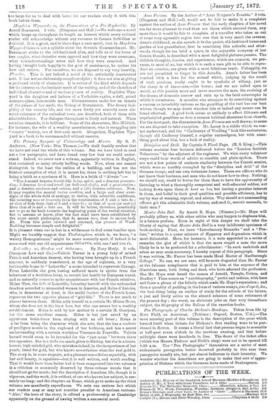Anne Furness. By the Author of "Aunt Margaret's Trouble." 3
vols. (Chapman and Hall.)—It would not be fair to make it a complaint against the author of Anne Furness that the early chapters of her novel are far more pleasant to read than are those which succeed them, any more than it would be fair to complain of a traveller who takes us out of some very agreeable region into one that is very much the reverse. Anne's childhood, as she spends it in the quaint, old-fashioned house and garden of her grandfather, first in something like solitude, and after- wards, though for too brief a space, in the enjoyable company of her Cousin Donald, is described with a most delightful picturesqueness. The childish thoughts, fancies, and experiences, which are common, wo pre- sums, to most of us, but which it is such a rare gift to be able to repro- duce on occasion, are given with a most felicitous tench. Unhappily, we are not permitted to linger in this Arcadia. Anne's father has been touched with a love for the animal which, judging by the result of such passions, really ought to be symbolic of villany, just as the sheep is of innocence,—the horse ; and we are called upon to watch, as this passion more and more masters the man, the evolving of the drama of domestic sorrow and ruin up to the fatal catastrophe in which it terminates. A moralist who attempts to do something against a custom so invariably ruinous as the gambling of the turf has our best wishes, though we may doubt whether this or indeed any means can be found effectual. A good book seems as unlikely to affect illiterate and unprincipled gamblers as does a sermon habitual absentees from church. For the most part, the characters in Anne Furness are well drawn ; to some- we are disposed to take exception. Mr. Lacey is a riddle which we can- not understand, and the "Cudberrys of Woolling " look like caricatures, though old Cudberry himself, a regular curmudgeon, but with some- thing good about him, has a look of reality.


































 Previous page
Previous page